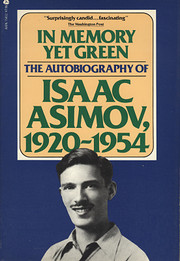

Click on a thumbnail to go to Google Books.
|
Loading... In Memory Yet Green: The Autobiography of Isaac Asimov (original 1979; edition 1980)by Isaac Asimov (Author)
Work InformationIn Memory Yet Green: The Autobiography of Isaac Asimov, 1920-1954 by Isaac ASIMOV (1979)
 No current Talk conversations about this book. The first part of Isaac Asimov's autobiography, covering the period from his birth to 1954, by which time he was an established science fiction author. It's quite interesting to me to see his gradual development as a scientist and writer, and to learn more about his inner makeup. I'd also always pictured him as an inveterate comic flirt with his female friends who would never proceed beyond flirting because of his inner shyness. But this is not the case; he eventually learned to accept advances, and even initiate them. I look forward to the second volume; by 1954 Asimov was quite pessimistic about making more than a moderate living from either his writing or his teaching. (This review applies to both Part 1 and Part 2). Asimov was brilliant, creative, and wrote some of the most enjoyable fiction (not just science fiction) ever written. And he knew it. This is part one of fascinating story of an immigrant who made it to the top--not only because he was brilliant--but because modesty wasn't in his vocabulary. Not sure I liked the man-and in even in an autobiography, you do feel sorry for his first wife, on whom he cheated and ignored and for his son,who obviously did not meet his expectations of what an Asimov should be, whereas he obviously adored his daughter and second wife. and you do get tired of reading how many books he wrote and how much he made. But there's a lot of insight in the creative process and the mind. Worth the read. no reviews | add a review
Awards
The first volume of the autobiography of a prominent scientist and prolific author, covering the first thirty-four years of his life. No library descriptions found. |
Current DiscussionsNonePopular covers
 Google Books — Loading... Google Books — Loading...GenresMelvil Decimal System (DDC)813.54Literature English (North America) American fiction 20th Century 1945-1999LC ClassificationRatingAverage: (4.23) (4.23)
Is this you?Become a LibraryThing Author. |
||||||||||||||||||||||||||||||||||||||||||||||||||||||||||||||||||||||||||||||||||||||||||||||||||||||||||||||||||||||||||||||||||||||
And I’m so glad that I did. Asimov’s book offers an incredibly rich mixture of personal detail and anecdote leavened with a dose of social history. After recounting his family’s history in Russia and his infancy there, he describes his family’s move to America and their efforts to build a new life in Brooklyn. While informative and well-told, his narrative assumes greater intimacy when he begins to draw upon his own personal recollections. From them he tells the story of a precocious child whose family worked hard to establish themselves in their new country. This they did through ownership of a succession of candy shops, at which Asimov worked every day after school. This gave him exposure to the range of dime novels and pulp magazines that were published at that time, which Asimov consumed avidly and which fueled his interest in becoming a writer.
This goal Asimov pursued while getting his education. Graduating from high school at the age of 15, Asimov enrolled in a branch of Columbia University with the goal of becoming a doctor. Asimov’s pride in being a child prodigy is mixed here with his annoyance with the discrimination he faced in his education. With the elite Columbia College closed off to him, Asimov started out instead at the less-prestigious Seth Low Junior College, which had been created to absorb the growing numbers of Jewish applicants. Though the junior college was merged into the general university during Asimov’s time there, his resentment is plain and more than understandable.
It was while he was in college that Asimov began writing the stories which made him famous. He gives enormous credit in this regard to John W. Campbell, the legendary editor of Astounding Science Fiction, who in a series of regular meetings encouraged Asimov to submit stories. Though two stories were rejected, the acceptance of a third by another magazine signaled the start of an incredibly prolific career. During these years Asimov wrote only short stories, producing during this period both the bulk of his “Robot” tales and the works that later became his even more famous Foundation trilogy of novels – all while earning two degrees in chemistry, working at the Philadelphia Navy Yard, and serving in the United States Army. It was also at this time that Asimov became acquainted with a veritable “who’s-who” of Golden Age SF, from L. Sprague De Camp and Frederick Pohl to Robert Heinlein and Wily Ley, many of whom he befriended and all of whom would dominate the genre for decades to come.
Asimov recounts his early life with evident forthrightness. Though far from modest, he is disarmingly candid about his flaws, including his personality quirks and his infidelity towards his first wife, Gertrude. When combined with his highly readable writing style it makes for an incredibly absorbing book, and one of the most pleasantly enjoyable ones that I have read in a while. This is not only a book that is a must-read for fans of Asimov or of Golden Age science fiction more generally, but it is one that everyone who likes reading evocative memoirs will find entertaining as well as informative. (